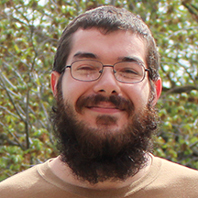Award-winning WSU undergraduate researcher Luis Cortez presents at international Gordon Conference in Spain
MEDIA: Shelley Pressley, Director of the Office of Undergraduate Research, WSU Undergraduate Education, 509-335-5488, spressley@wsu.edu
Emma Epperly, Communications and Marketing Junior Assistant, WSU Undergraduate Education, 509-335-9458, UCHCCommMar.5@wsu.edu
 PULLMAN, Wash.—Washington State University senior Luis Cortez has been invited to present his research June 4 at the Gordon Research Symposium on mechanisms of mutagenesis and genome alterations in Girona, Spain. The symposium is for young researchers, and is part of and precedes the prestigious Gordon Research Conference, which Cortez will also attend.
PULLMAN, Wash.—Washington State University senior Luis Cortez has been invited to present his research June 4 at the Gordon Research Symposium on mechanisms of mutagenesis and genome alterations in Girona, Spain. The symposium is for young researchers, and is part of and precedes the prestigious Gordon Research Conference, which Cortez will also attend.
His topic will be “APOBEC3A and APOBEC3B Preferentially Deaminate the Lagging Strand Template during DNA Replication.”
That is also the title of a paper he published in January 2016 in Cell Reports with James Hoopes, a graduate student, and Tony Mertz, a post-doctoral researcher in the lab of Steven Roberts, assistant professor in the School of Molecular Biosciences (SMB). Mertz will also attend the Gordon Conference, and he and Cortez have plans to submit another paper for publication this summer.
Cortez received support to attend the symposium and conference from the Office of Undergraduate Research, the Louis Stokes Alliance for Minority Participation (LSAMP), the SMB, and Multicultural Student Services. He is a first-generation student and is from Othello, Wash.
Girona is a famous medieval city, most recently in the news as the site of season-six filming in summer 2015 for the popular HBO series Game of Thrones (GOT). Ancient passageways and buildings in the Mediterranean seaside town stood in for fictional GOT locations such as King’s Landing, Braavos, and Oldtown.
Enzyme research
Cortez investigates a family of enzymes (APOBEC) that exist in mammalian cells and damage viruses that have invaded the cell as part of an innate immune response. They have been found to work against HIV, for example. But the enzymes can latch onto any DNA, including the cell’s own DNA, and cause mutations that can damage DNA as it replicates, potentially leading to cancer. Further, as cancer cells replicate at an elevated rate, the enzymes have an opportunity to exacerbate the mutagenesis in cancers. Based on the findings that Cortez presented at the Annual Biomedical Research Conference for Minority Students (ABRCMS) looking at mutations APOBECs caused in a specific region of a chromosome, the lab has since expanded its investigation to assess how these enzymes cause mutations across the whole genome.
Awards progression
The research Cortez conducts has brought many opportunities and awards his way. He shared his work at the 2015 Pacific Northwest LSAMP Conference; LSAMP is a National Science Foundation-sponsored program for students in science, technology, engineering, and mathematics (STEM) programs with plans to earn doctoral degrees. He presented at the SMB Conference with graduate student James Hoopes, and received a travel award to attend the LSAMP national conference in fall 2015. In late 2015, Cortez was the top awardee in the developmental biology and genetics category at ABRCMS.
He received the Norma C. Fuentes and Gary M. Kirk Award for Excellence in Undergraduate Research for his presentation at WSU’s 2016 Showcase for Undergraduate Research and Creative Activities (SURCA).
And, his Gordon presentation is his second, the first being at the 2016 Gordon Conference on DNA damage, mutation & cancer in Ventura, California in March. He was the only undergraduate who presented a poster at that conference.
Following graduation
Cortez graduates May 9 in Pullman with degrees in biochemistry and genetics and cell biology. He plans to seek his M.D. and a Ph.D. and build a career researching human health issues and transfer his discoveries into his medical practice. The coming year will be a gap year for him before graduate school, and he will continue working in the Roberts lab.